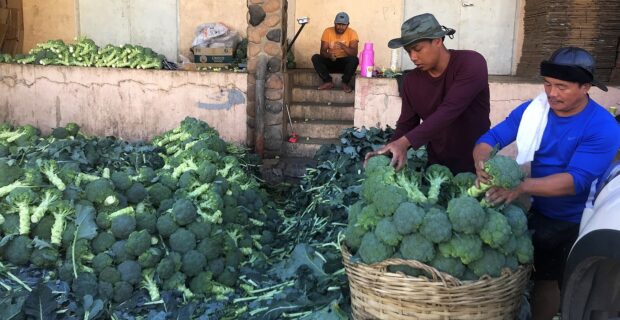Sustained funding for Cordillera vegetable farming pushed

WORKING WITH GREENS | Benguet province and some farms in Mountain Province and Ifugao supply 80 percent of the daily salad vegetable demand in Luzon. Shipments of broccoli, cauliflower,
potatoes, carrots and other vegetables are cleaned at Benguet Agri-Pinoy Trading Center in La Trinidad town before these are packed for delivery to Metro Manila and other areas. (Photo by VINCENT CABREZA / Inquirer Northern Luzon)
BAGUIO CITY, Benguet, Philippines — Continuous fund allocation for upland farming, which could be equivalent to the resources poured into national rice production, is being considered by three Cordillera lawmakers to help improve the region’s economy.
Agriculture in the Cordillera has not been getting the kind of support that has been devoted to national programs involving rice and corn because the region’s annual farm yield has been comparatively small, said Cameron Odsey, Cordillera director of the Department of Agriculture.
Odsey made the remarks at a Tuesday public consultation on regional autonomy that was led by Kalinga Rep. Allen Jesse Mangaoang, Mountain Province Rep. Maximo Dalog Jr., and Baguio Rep. Marquez Go.
Annual appropriations go to high-impact programs, like rice and corn production, which are predominantly in the country’s lowland farms, Odsey said.
“A national government strategy in the past was to implement special projects in [upland farming] areas but all projects end unlike regular banner programs that have regular budgets,” he said.
Benguet province and small farms in Ifugao and Mountain Province have profited from vegetables because 80 percent of Luzon’s daily supply of semitemperate crops, like lettuce, broccoli, cabbage, carrots and potatoes, come from these areas, Odsey said.
Market expansion
But the rest of the Cordillera’s farming towns need better support to also improve and expand their marketability, he said.
A more focused upland farming policy would help farmers and “poorer Cordillera communities that do not produce rice or vegetables commercially,” who are excluded from the regular programs of the national government, Odsey said.
He asked the lawmakers to include a policy provision in the autonomy bill regarding mountain farming.
But Go said all seven Cordillera congressmen would instead incorporate a special budgetary provision for highland agriculture in the next General Appropriations Act to jump-start Cordillera farming.
Appropriations from the national rice program have benefited the lowland rice farms of Kalinga, Apayao and portions of Ifugao and Abra, but upland farms like the rice terraces of Ifugao “cannot qualify because of low yield,” Odsey said.
Some of the Ifugao rice terraces have since been abandoned, said Jovita Ganongan, Cordillera director of the Department of Tourism, during the discussion.
At a March 22 tourism briefing, Banaue Mayor Joel Bungallon said some terraces had been converted into vegetable gardens by farmers fighting to keep their livelihood as they recover from health and mobility restrictions imposed due to the COVID-19 pandemic.
These farms are outside the clusters of rice terraces in the towns of Kiangan, Banaue, Hungduan and Mayoyao which were declared a World Heritage Site by the United Nations Educational, Scientific and Cultural Organization.
According to the Philippine Statistics Authority (PSA), last year’s total rice production in the Cordillera had dropped to 338,067 metric tons (MT) or a decrease of 10.4 percent from the 377,133 MT generated in 2021.
Cordillera’s vegetable production contracted by 4.17 percent from 366,314.56 MT in 2020 to 351,030.97 MT in 2021, the PSA said. Production again contracted by 1.8 percent from 144,565.7 MT in the first semester of 2021 to 142,030.5 MT during the same period in 2022.